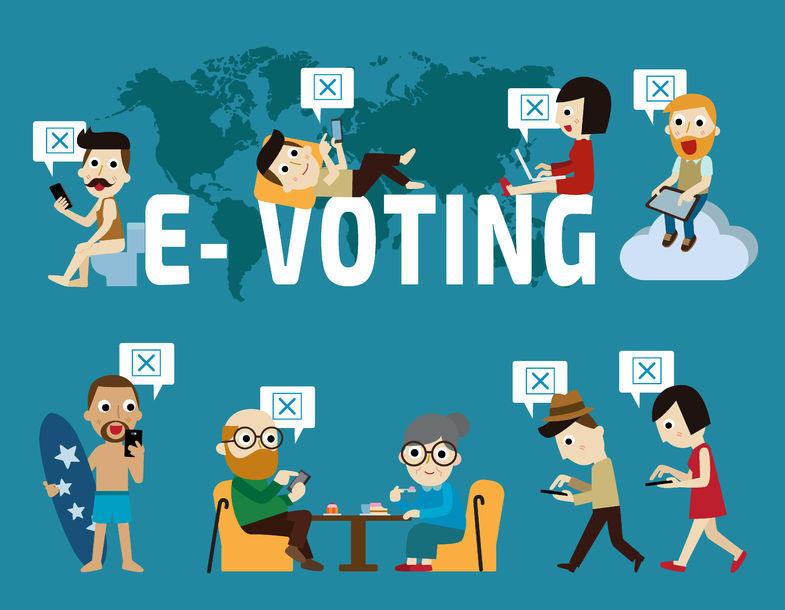
Ten arguments for and against e-voting

Is voting online a big step forwards or backwards? Opinion in Switzerland about the use of electronic voting is divided.
The Swiss have more chances to express their opinions at the ballot box than anyone else in the world thanks to their extensive system of direct democracy. Wouldn’t it be more practical if you could do so with the click of a mouse?
The Swiss government is convinced. From 2019, two out of three cantons (26 in total) could have e-voting in place. But data protection campaigners and IT experts warn of the dangers; opponents will probably launch a people’s initiative on the issue.
These are the ten most commonly heard arguments for and against e-voting:
Organisation of the Swiss Abroad (OSA)
The issue of e-voting has been on the agenda of the Organisation of the Swiss Abroad (OSA) for many years.
The OSA’s assembly, the Council of Swiss Abroad, is meeting on Saturday in the Swiss capital, Bern. A panel discussion is taking place, entitled “E-Voting: Opportunities and Risks”, led by Franz Grüter, a Swiss People’s Party parliamentarian from Zurich, who has filed an initiative on this issue calling for an e-voting moratorium. He will be joined by Claudia Pletscher, Head of Development and Innovation at Swiss Post. swissinfo will report on this issue.
For 1: Voting is easier
Electronic votes can be sent from the comfort of your armchair, while on holiday or even in the middle of the night. You no longer have to make that tedious walk to the polling station or to the post box to send your ballot.
For 2: The Swiss Abroad will no longer be at a disadvantage
Swiss citizens living abroad often receive voter information by post too late and can no longer cast their ballot. E-voting would ensure a more reliable process.
For 3: Greater voting rights
When there are fewer obstacles to voting, in theory more citizens exercise this right. Young people, who traditionally vote less often, would more likely be interested in getting their voice heard via e-voting. Greater participation and better representation of all sections of the population must be welcomed from a democratic point of view.
For 4: Less invalid votes
With e-voting there are no invalid votes caused by errors made on the ballot paper. Swiss voters often make mistakes when filling out and submitting ballots. During the last elections for the local parliament in Zurich, for example, 26% of all votes were invalid. In one district, the percentage was as high as 41%.
For 5: No system is 100% secure
When asked about the security issues surrounding e-voting, supporters argue that no system is foolproof. In the past, there have been several cases of electoral fraud in Switzerland. This can be done by stealing envelopes containing the ballot papers sent in the post and then voting with a forged signature on behalf of the person who was robbed.
Against 1: Vote secrecy is not guaranteed
According to data protection specialists, e-voting invalidates voting secrecy because not all transactions are comprehensible to the voter. The systems currently available cannot protect privacy in the user environment, meaning that a malware-infected computer could violate the confidentiality of the vote.
Against 2: Elections and votes can be manipulated
The biggest problem, say critics, are security risks such as hacking, vote-buying and other manipulations. By introducing a virus into a computer, votes could be altered. If elections or votes can be manipulated on a large scale by criminals, foreign intelligence services or companies, this would mean the end of democracy, critics warn.
Against 3: A recount is not possible
Unlike physical ballots, electronic votes cannot be counted manually. With e-voting, the counting is done centrally. There are no individuals to add up votes or election observers who ensure that the voting process runs smoothly and checks are carried out. Citizens must blindly trust the e-voting system.
Against 4: E-voting is expensive
Opponents argue that the costs of e-voting are extortionate: at least CHF700 million ($736 million) would be required to introduce e-voting across Switzerland. An electronically delivered vote is considerably more expensive than a vote posted in an envelope.
Against 5: The introduction of e-voting is undemocratic
Two-thirds of all cantons may in theory vote electronically by 2019. However, the legal basis for this is still lacking and should be finalised only in 2020/21. That is when parliament and voters – if there is a referendum – will be able to decide. Critics complain that e-voting is therefore being introduced prematurely and without any democratic decision.

More
How long before all Swiss expats can use e-voting?
Contact the author @SibillaBondolfi on FacebookExternal link or TwitterExternal link.
Translated from German by Simon Bradley

In compliance with the JTI standards
More: SWI swissinfo.ch certified by the Journalism Trust Initiative
















![The four-metre-long painting "Sonntag der Bergbauern" [Sunday of the Mountain Farmers, 1923-24/26] had to be removed by a crane from the German Chancellery in Berlin for the exhibition in Bern.](https://www.swissinfo.ch/content/wp-content/uploads/sites/13/2025/12/01_Pressebild_KirchnerxKirchner.jpg?ver=bb19e376)















You can find an overview of ongoing debates with our journalists here . Please join us!
If you want to start a conversation about a topic raised in this article or want to report factual errors, email us at english@swissinfo.ch.